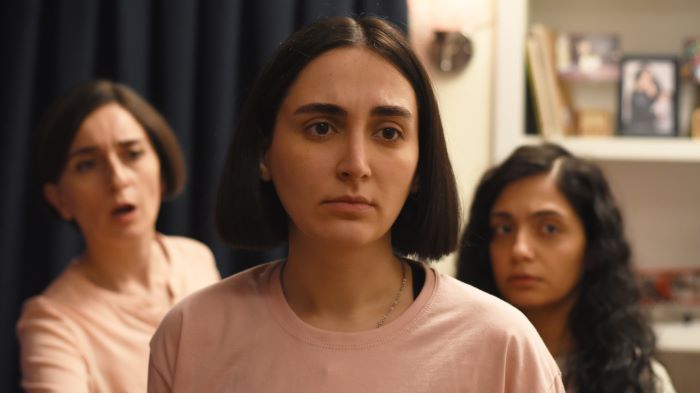Known for tackling the social issues of his native Iran in There Is No Evil and A Man of Integrity, director Mohammad Rasoulof fled the country prior to the screening of The Seed of the Sacred Fig at this year’s Cannes Film Festival: He faced the threat of arrest by the Iranian government for producing “propaganda films.” In the wake of protests following the 2022 killing of Mahsa Amini—who died in police custody after being arrested for not wearing a hijab—Rasoulof made his latest film in secret over two months and edited it in Germany, showcasing immense bravery in filmmaking.
The title refers to the strangler fig. Its parasitic seed grows and wraps long roots around other trees, eventually suffocating them. Rasoulof extends this metaphor to the smallest unit of society—the family. Iman (Misagh Zare) is a lawyer recently promoted to an investigating judge. (His name broadly means “faith” in Islamic theology.) His wife, Najmeh (Soheila Golestani), has dedicated her life to their family and celebrates what she believes to be good news: It brings the promise of greater wealth and security. Beneath her optimistic façade, however, she worries about the attitudes and behaviors of her teenage daughters, Rezvan (Mahsa Rostami) and Sana (Setareh Maleki), urging them to conform to societal norms. After Iman’s promotion, even stricter expectations are placed upon the girls.
Covertly, the daughters closely follow news of protests after the death of Amini on social media. They reject the fabricated version of events broadcast on government-supported television. Despite their awareness of social and political issues, their mother warns them to stay away from activism, especially because of their father’s deeper involvement with the Iranian judicial system.
The household’s orderly existence is further disrupted by the arrival of Rezvan’s free-spirited college friend, Sadah (Niousha Akhshi), who has been subjected to police brutality at a protest against the compulsory hijab. Sadah’s presence tests the limits of Najmeh’s tolerance. Torn between family, duty, and conscience, Najmeh frequently hears her daughters asking: What if this violent assault happened to your own children? When Sadah becomes injured at a protest and placed in a dire situation, Najmeh reluctantly but dutifully helps her. As the daughters become increasingly vocal, the tension within the household escalates, pitting them more and more against their parents. These confrontations, bolstered by the strong performances from Rostami, Maleki, and Golestani, are among the film’s most powerful moments, sustained by a simmering sense of tension.
Another pivotal moment occurs when Iman’s gun goes missing somewhere in the house, adding Chekhovian suspense to an already intense story. The paranoia from the streets seeps into the home of this bureaucrat, who is caught between loyalty to his country and his family. The film also explores the concept of an unseen, superego-like “boss,” conveyed through hearsay and Iman’s colleagues. As tensions rise, the family finds themselves drawn into a nerve-wracking investigation over the lost gun. The interrogation sequence is masterfully shot, with an impending sense of calamity signaling the collapse of a family consumed by paranoia and blind duty to authority, no matter the cost.
However, as the film enters its final act, it shifts away from the family drama and abruptly transitions into a cat-and-mouse thriller. Ironically, the story loses momentum as the action intensifies, and the film drifts away from its strongest elements—its critique of power through Rasoulof’s subtle direction. The resolution relies on contrived plot devices, reducing the characters to two-dimensional figures. At times, the tone even veers into melodrama, stripping the characters of their agency.
Despite this, the allegorical family drama still raises important questions about the limits of control in the name of faith. The strangler fig metaphor is carefully and subtly woven into the core of the story. The film’s strength lies in the intricate exchanges between its female characters. Although it loses some of its momentum, The Seed of the Sacred Fig remains a compelling critique of power, featuring one of the year’s strongest ensembles.

















Michael Moore says this film is his favorite of the year. I can’t wait to see it.